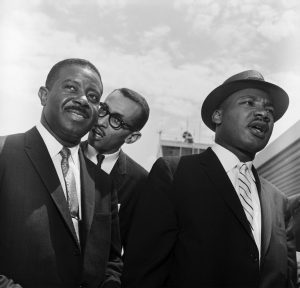
The Rev. Wyatt Tee Walker, center, in 1961 with the Rev. Dr. Martin Luther King Jr. and another King aide, the Rev. Ralph Abernathy, in Montgomery, Ala. Getty.
By Fernanda Santos
The Rev. Wyatt Tee Walker, who was chief of staff to the Rev. Dr. Martin Luther King Jr. and a key strategist behind civil rights protests that turned the tide against racial injustice in the Jim Crow South of the 1960s, died early on Tuesday at an assisted-living facility near his home in Chester, Va. He was 88.
***
“I was fully committed to nonviolence, and I believe with all my heart that for the civil rights movement to prove itself, its nonviolent actions had to work in Birmingham,” he continued. “If it wasn’t for Birmingham, there wouldn’t have been a Selma march, there wouldn’t have been a 1965 civil rights bill. Birmingham was the birthplace and affirmation of the nonviolent movement in America.”
Dr. Walker helped circulate “Letter From Birmingham Jail,” one of the most important documents of the civil rights movement, in which Dr. King argued for civil disobedience as a legitimate response to racial segregation. He also helped organize the 1963 March on Washington for Jobs and Freedom, which culminated with Dr. King’s “I Have a Dream” speech.
***
Dr. Walker was long on the front lines in the fight against drug trafficking and addiction in Harlem, recruiting other churches and community groups to help in that effort.
“We wanted our children to have a choice that was better than drugs,” he told The Times in 2015, adding, “You couldn’t buy aspirin” in the neighborhoods, “but you could buy any kind of drug.” The police, he said, were “overwhelmed.”
“We just felt they weren’t doing anything about it.”
At one point the Harlem drug kingpin Frank Lucas “put a hit out on me,” he said, “because I was effectively thwarting the drug traffic.” But he said he had shrugged off the threats.
“They were always warning me that it was dangerous, but that didn’t stop me,” he said. “I had been involved in the struggle in the Deep South, so I was accustomed to dangerous situations. It was tough to frighten me, because I was so convinced that God would take care of me.”
To read entire New York Times article, click HERE
